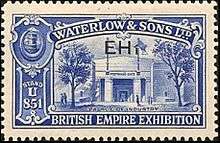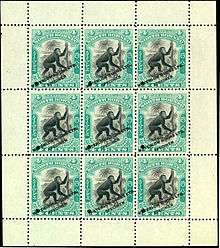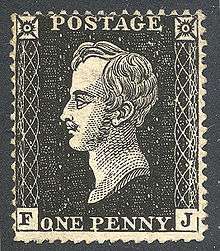Printer's sample stamp
A printer's sample stamp is a label produced by a printer resembling a stamp, but with no postal or other validity. Often it will include the name of the printer and demonstrate their printing capabilities. The stamps are not intended for use and are therefore to be distinguished from test stamps, though both test stamps and printer's sample stamps are dummy stamps in the broadest sense of that term.




De La Rue
The R.M. Phillips Collection at the British Postal Museum and Archive contains a number of sample stamps produced by De La Rue before 1900, bearing their name and demonstrating their printing abilities for the British Post Office.[1]
Waterlow & Sons
Waterlow & Sons produced many small sheetlets of sample stamps in the same design as genuine stamps produced for their customers, but with the colours changed and overprinted diagonally "Waterlow & Sons Ltd. Specimen". The stamps in these sheetlets were also punched with a small hole in the corner to prevent their postal or revenue use and the sheetlets were displayed at the 1910 Brussels Exhibition.[2] Clive Akerman comments in The Presentation of Revenue Stamps: Taxes and Duties in South America, that the stamps were produced from obsolete dies.[3]
The Prince Consort Essay
The Prince Consort Essay was a printer's sample stamp created in 1851[4] as an example of the surface printed stamps that Henry Archer proposed to print and perforate under contract with the British government at a lower price than the current printing firm of Perkins Bacon. The Prince Consort stamps were provided by the artist Robert Edward Branston, from an engraving executed by Samuel William Reynolds.
Although commonly known as an essay, the stamp was not really an essay as it was never intended that a postage stamp be produced based on the design, nor was it an un-adopted design. It is more accurately described as a printer's sample stamp.
Worldwide
The concept has been used worldwide with modern sample stamps from printers in Switzerland and the Netherlands, amongst other countries, commonly seen in philatelic circles.
See also
- Cinderella stamps
- Specimen stamp
References
- RM Phillips Collection. Archived 2012-07-16 at Archive.today British Postal Museum & Archive, 2013. Retrieved 1 July 2013. Vol. XLIV POST 141-44.
- "Waterlow's Samples" in Stamp Magazine, April 2011, p. 47.
- Akerman, Clive. (2002) The Presentation of Revenue Stamps: Taxes and Duties in South America. Letchworth: The Revenue Society of Great Britain, p. 39.
- Prince Consort essay. Stamp Printing and Perforations, British Postal Museum & Archive, 2013. Retrieved 1 July 2013. Archived here.
External links
| Wikimedia Commons has media related to Printers sample stamps. |